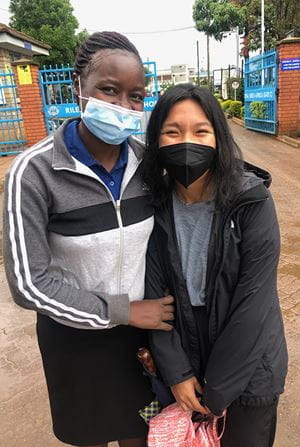Micaela Gaviola is a second-year medical student at Indiana University (IU) School of Medicine. She is one of three Slemenda Scholars who spent the summer in Eldoret, Kenya, with the AMPATH partnership.
Let’s be honest, it can sometimes be difficult to see the bigger picture while doing research. It’s even more difficult when the research you are working on is with a population more than an ocean away.
Although this was my challenge, I was fortunate to have the incredible opportunity to travel to Kenya as a Slemenda Scholar this past summer and experience first-hand the bigger picture behind the research I was completing.
Wazesha Watoto translates to “empowering children.” This project was aptly named by Drs. Eren Oyungu and Megan McHenry. Their AMPATH collaboration intrigued me because of the bigger picture they envisioned. Their goal is to use their research to guide the development of a clinic for neurodevelopment at Moi Teaching and Referral Hospital (MTRH) in Eldoret, Kenya. On my first day in Eldoret, Dr. McHenry walked me to the site of their future clinic, next to Shoe4Africa Children’s Hospital and across from the Riley Mother and Baby Hospital. As she enthusiastically explained all the team effort that is making their dream become a reality, my bigger picture began to come into view too.
The aim of my Slemenda project was to assess the implementation of a screener for developmental delays in children born to mothers infected with HIV. In school, we learn a lot about patient-centered care. A crucial part of providing that care is intentional consideration of where the patient comes from. I was excited to work on a project that was tailoring interventions to better fit this population with their cultural background in mind. Part of the job involved asking my Kenyan colleagues about the norms of raising Kenyan children. This was always fun because it often ended up with the opportunity to hear all about and gush at adorable photos of their own kids.
 This summer was more than just collecting and analyzing numbers. This summer involved humorously navigating language barriers with the mentor mothers I worked alongside. It required playing IT consultant to help my research team set up their computers and printers. It consisted of listening intently to stories of kin and country told by public health officers during a lull in clinic. It was sweetened by opportunities to drink the best chai prepared by my coworker and friend Mercy. Those small moments in which I was privileged to connect and collaborate with my new Kenyan friends were the interactions where I learned the most this summer.
This summer was more than just collecting and analyzing numbers. This summer involved humorously navigating language barriers with the mentor mothers I worked alongside. It required playing IT consultant to help my research team set up their computers and printers. It consisted of listening intently to stories of kin and country told by public health officers during a lull in clinic. It was sweetened by opportunities to drink the best chai prepared by my coworker and friend Mercy. Those small moments in which I was privileged to connect and collaborate with my new Kenyan friends were the interactions where I learned the most this summer.
Currently, I am in the thick of my second year of medical school and still analyzing the science of implementing the neurodevelopmental screeners. Now though, it’s no longer difficult to see the bigger picture. I just transport to the time when I was sitting in the middle of the small yet lively Maternal and Child Health clinic at Shoe4Africa. In the midst of writing down datapoints, I witnessed a mother bending at the waist and setting her baby skillfully atop her back. Swiftly, she intricately wrapped the baby around her body with a brightly colored scarf so they became one. I observed this simple act of parenting again and again, and I thought about how symbolic it was – a mother carrying the weight of her world, her child, on her back – and the bigger picture was revealed.
IU School of Medicine 1st-year students interested in applying to be a Slemenda Scholar in the summer of 2023 can do so through the IU Medical Student Program for Research (IMPRS) process. The application opens in November.
